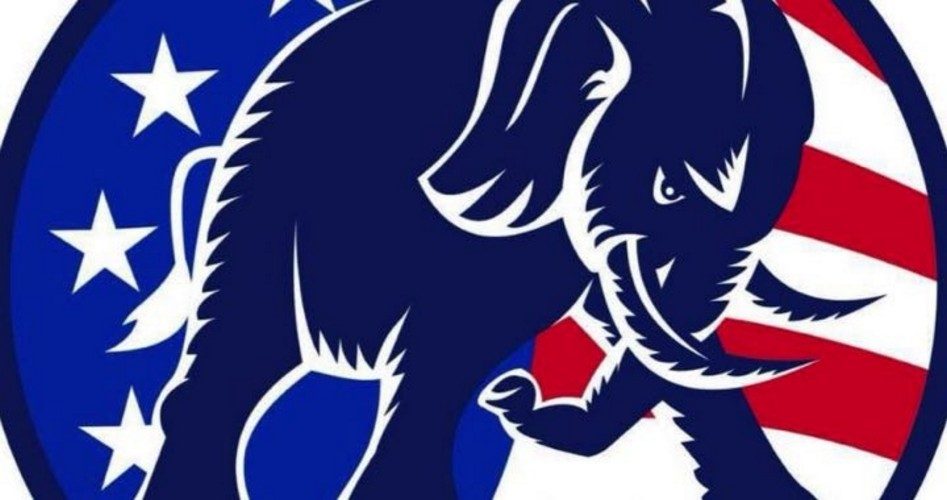
Stanford College reversed its decision to ban the use of the American flag on College Republicans’ t-shirts after significant backlash.
Stanford College Republicans designed new t-shirts that featured a charging elephant superimposed on an American flag with the words “Stanford College Republicans,” but the university rejected the logo citing the use of the American flag. Officials pointed to the school’s trademark guide, attempting to claim that the censorship was over copyright infringement, despite the fact that the guide makes no mention of flags whatsoever. A university official attempted to claim that the policy was part of a broader one intended to avoid associating the Stanford name with specific political positions.
“Stanford does not approve the use of the American (or other flag) on product also featuring our trademarks (including the Stanford name),” Stanford University’s trademark licensing associate, Kara Hegwood, wrote in an e-mail to the College Republicans last month.
Hegwood wrote the university “can approve red/white/blue themed product but cannot approve this design which features [an] altered version of the flag in the background of the design, and within the initials for the organization name.”
John-Rice Cameron, the College Republicans’ incoming president, argued that the new design was important to the group because it represented a new future for the organization.
“The [new] logo is emblematic of our club,” he said. “It shows we are willing to boldly promote conservatism.”
Fortunately, the university has since changed its tune after the College Republicans contested the decision as “ridiculous,” and Americans voiced their anger over the absurd ruling.
“Stanford College Republicans is welcome to use the images of the U.S. flag reflected in the current design of its logos,” university spokeswoman, Lisa Lapin, told Fox News. “We now recognize that the specific policy was framed in an overly restrictive manner.”
E.J. Miranda, Stanford’s senior director of media relations, elaborated that the entire ordeal has prompted the university to rethink its trademark policy on the use of flags, particularly the American flag.
“As a result of this review, Stanford College Republicans is welcome to use the images of the U.S. flag reflected in the current design of its logos,” Miranda wrote in an e-mail to the College Fix. “We will also be considering Stanford’s overarching policy on use of flags over the coming weeks.”
Rice-Cameron told the College Fix that the organization received tremendous support from “thousands of Americans.”
And while the College Republicans are unsure why the American flag was ever considered controversial by the university, they are relieved that the school has reversed its decision. “We are glad that Stanford has made the right decision. The Stanford College Republicans are honored to have seen the support of patriots across the country for our organization,” Rice-Cameron told Fox News. “We are now more emboldened than ever to continue our efforts to promote liberty on Stanford’s campus.”
Sadly, Stanford University is not the only academic institution to treat the American flag like an object from which to disassociate itself. In 2015, for example, students at the University of California, Irvine attempted to ban the flag from being displayed in the lobby area of the offices of the student government. Fortunately, those actions received a swift and immediate backlash and were reversed within days.
In 2016, Hampshire College in western Massachusetts flew the flag at half-mast the day after the 2016 presidential election to mourn President Trump’s victory, Breitbart News reports. After that, the college removed the flag entirely.
“We are alarmed by the overt hate and threats, especially toward people in marginalized communities, which have escalated in recent weeks. We did not lower the flag to make a political statement. Nor did we intend to cause offense to veterans, military families, or others for whom the flag represents service and sacrifice,” Hampshire College president Jonathan Lash wrote in a statement. “We acted solely to facilitate much-needed dialogue on our campus about how to dismantle the bigotry that is prevalent in our society.”
The school’s decision was protested by a group of veterans and other members of the community, compelling Hampshire College to restore the flag to its rightful place.
Meanwhile, the student senate at the University of California-Davis came into hot water last year after it voted to make the American flag optional at gatherings, allowing students to remove it if it makes them uncomfortable. “The flag to a lot of people represents capitalism, colonialism and the genocide of indigenous people, and this is why we don’t want the flag in meetings,” said UC-Davis student Becca Payne.
Image: Screenshot from Stanford College Republicans’ facebook page




